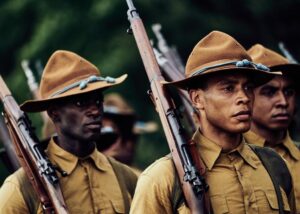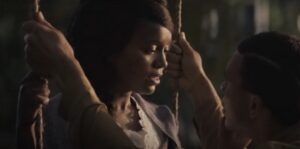

Director Kevin Willmott’s film “The 24th” tells an important but little-known story in American race relations: the Houston Mutiny of 1917. In the same way that many Americans are learning about the Tulsa Race Massacre of 1921 for the first time, Willmott’s film introduces Americans to another-century old hidden but important story. The script is written by Willmott and a former KU pupil, Trai Byers. This analysis of the film tells what happens, so a spoiler alert is in order.
The charismatic Kansas native Trai Byers not only co-wrote the script, he plays the lead role of William Boston, a light-skinned private who is viewed by other members of the all black 24th Army Infantry Regiment as “not one of them” due to his light skin and the fact that he has a degree from the Sorbonne in France. Boston lived in France during peacetime and saw what was possible in the United States because he experienced no racism in France.
Some critics see the love story between Boston and a seemingly haunted local woman, Marie, as an artificial plot device stitched into the story of the Houston Mutiny of 1917. But the romance between William Boston and Marie is the heart of the movie’s message. To say that the romance between Pvt. Boston and Marie is something grafted into the story of the Houston Mutiny would be like saying that the romance between Adrian Pennino and Rocky Balboa in Rocky (1976) is superfluous and is stitched into a boxing movie.
Marie (played by Aja Naomi King) has darker skin than Boston. She has never traveled, having spent her whole life in Houston, a preacher’s daughter. She knows that William Boston’s bromides about “life liberty and the pursuit of happiness” are a fiction for black folks like her in the Deep South in 1917. Boston does not fully know the depth of the problem or that the sacrifice the solution will require.
Marie is not well-educated like Boston but growing up as a Pastor’s daughter has made her into an extraordinary pianist. Her folks are dead, and she is no longer playing hymns in church. Now her piano brings to life the ragtime music of Scott Joplin, Eubie Blake and other luminaries. She has only listened to their records: Boston has seen them in concert in New York City. Marie is a gifted ragtime pianist who could make it in Harlem in the music scene, but she seems chained to her hometown of Houston, afraid to venture north due to her shame and sense of unworthiness.
During a particularly beautify scene, Boston pushes Marie back and forth on a swing beneath a giant tree. Boston waxes on about the America’s founding principles: “life, liberty and the pursuit of happiness” while pushing Marie back and forth. The forward and backward motion of the swing, connected by thick rope, suggests that racial progress in America swings forward a bit, but then swings back in an ugly direction. Riding on a swing might be amusing, but it does not move you forward. This poignant scene also gives a prophecy as to Boston’s fate.
Pvt. Boston’s time in France renders him optimistic about “life, liberty and the pursuit of happiness” soon being equally shared by Americans. But Marie knows damn well that blacks in the Deep South in 1917 don’t enjoy “life, liberty and the pursuit of happiness.”
Boston’s attitude seems informed by Booker T. Washington. Boston is shown reading Washington’s book “Up from Slavery” inside his military tent. At the beginning of the film, he believes that if blacks work hard and show a good example, that white folks will see their merit and grant them more rights. The idea that simply being good will lead to progress is ridiculous to Marie. She worked hard and played by the rules, yet she is immobile.
Marie feels deep shame about a wrong that occurred to her. Although she was sinned against, and blameless, but was scapegoated. Her own father, a jack-legged preacher, takes sides against Marie after his favorite Deacon rapes her. Her father throws Marie on the street, and labels her a Jezebel, ruining her reputation. So much for being virtuous and expecting good results. She becomes a pariah.
Marie is a symbol for African-Americans after the Civil War. They did not want to come to America. Their ancestors were dragged here in chains. Slavery dehumanized them, and then after the Civil War, the former slaves and their ancestors experienced lynching and Jim Crow and continue to face race prejudice. They still bear “the badge of slavery.” Even today the black community is often cast as the scapegoat for America’s woes.
Unlike Boston, Marie know that the stain of America’s original sin of slavery is not going to get any be removed until there is an atonement, a reckoning. Marie also cannot recover from her psychological wounds without a major development. Marie’s story reveals that certain member of the African-American community are less than helpful in her journey. In addition to her father’s betrayal and that of the Deacon who hurt her, the film includes a local Houston busybody (probably the Deacon) who tries to prevent Marie from marrying the brilliant and progressive Boston.
The busybody enjoys stirring up fear with the visiting soldiers, running to Camp Logan to give them exaggerated or flat wrong information. The collision between the soldiers and the rigid Jim Crow atmosphere in Houston is already dry tinder. But the busybody seems to enjoy pouring gas on the fire. In fact, the Houston Mutiny was caused by false information as much as anything. The troops were already on a ragged edge, knowing that white mobs had destroyed black communities in E. St. Louis and Chester, Pennsylvania earlier that summer. Misinformation was the last thing they needed.
As trained soldiers, they want to show their military skills in France, not in the old Confederacy. But the frustration and fear spill over, fueled in part by misinformation that two members of the 24th were killed by policemen in Houston. Furthermore, they are misinformed that a white mob has declared war on the 24th, is going to attack Camp Logan at once, as had happened in several American cities that summer. The source of most of this information is the busybody who vexes Marie. In a reflexive fashion, fueled by bad information which lead to notions of self-defense, the 24th goes mutinous and marches on Houston on the night of August 23, 1917. They act as regimented soldiers and march into Houston to fight back against the racist Houston police and the white mob they believe is heading their way.
“This is our France!” shouts the grizzled Sarge (played by Mykelti Williamson). When the mutiny of the 24th is finished, eleven white civilians and five white policemen are killed. The black troops pushed back against a hostile enemy; blood is shed. When the mutinous soldiers began their march on Houston, they felt justified: it was their Little Big Horn, a justified attack on a hostile power.
But their actions were based on a false assumption that two members of the 24th had been murdered in Houston by racist policemen, and by the bogus but believable rumor that a white mob was going to attack them. By the end of the melee, they realize they have accidentally killed a white Army soldier and several civilians, in addition to five Houston policemen. When “Sarge” realizes that the military maneuver he led went bad, he knows he will be court-martialed and executed. He commits suicide.
A price must be paid, an atonement. An eye-for-an eye. Although Boston marched with his fellow soldiers in the mutiny, he did not fire his weapon. He now knows that the Booker T. Washington approach of accommodation is not enough to effect change, but to his credit, he remains nonviolent while marching in the mutiny. The familiar archetype is clear: an innocent person, a scapegoat, must die for the sins of all. The mutiny of the 24th results in the largest murder trial in U.S. history.
The ringleaders of the mutiny must die by hanging. Boston is offered a chance to play the Judas figure. He has a brilliant future and wants to marry Marie and move to New York with her. But he refuses to betray his fellow soldiers. At the beginning of the film, the other soldiers think Boston is “not one of them.” However, he destroys that notion.
Boston has undergone a change from the naive “lead by example” philosophy of Booker T. Washington, to a realist who knows that the problems experience by Marie and others required an atonement, an expiation. Although he did not fire a shot, Boston understands why the Mutiny happened and he stands with his brothers.
There is no need for Director Willmott to show the gruesome hanging of the 12 ringleaders plus the innocent Boston. Once Boston chooses his fate, he has a flashback of Marie’s smiling face, as he pushes her on the swing. He will swing from a rope as well.
The white Col. Norton delivers a letter to Marie that Boston wrote to her before his execution which says that he died for her and her future husband and children, for generations yet unborn. Earlier in the film Boston reminds Marie what his parents taught him: “If you die for justice,You never really die.” The noble actions of Boston give Marie the gift she needed most: a catharsis. Her shame is gone. The mutiny, aftermath, and the sacrificial act of Boston cut her chains, freeing her to move to Harlem and share her musical talent, and leaving the old Confederacy behind.
The film ends with an image of Marie, smiling, dressed to the nines, sitting on a train car, heading to Harlem, finally able to move forward. Boston’s naive bromides earlier in the film about “life, liberty and the pursuit of happiness” seem possible to her now. Marie represents the future. One is left with the impression that America can never have a catharsis over its original sin of slavery by small, symbolic gestures. Innocent blood must be shed. Although the film is set in 1917, this 2020 movie feels all too contemporary.
To those whites who say: “I never owned a slave. Neither did my ancestors,” I understand. My Irish ancestors immigrated to America after the Civil War, and so did my German Mennonite ancestors on my mother’s side. But the problem is not that you or your ancestors owned slaves, the problem is that we are citizens of a country that built slavery into our Constitution. When I was a college professor, I blushed when I taught students about the the 3/5 compromise embedded in the Constitution. If there happened to be an African-American student in the class, I could hardly even say say it outloud. The Founding Fathers were bright, and the Constitution is ingenious in its “separation of powers” and other doctrines. But the founders kicked the can down the road on slavery, and we had to deal with it in a much worse way later with the Civil War ending in 1865. The amendment process of the Constitution has allowed us to correct mistakes, such as slavery, women’s suffrage, etc.
The issue of American Apartheid was embedded after the Civil War: Jim Crow at the ballot box, in public education, and in private accommodation. The politicians kicked the can down the road another hundred years after the Civil War to address these issues in the 1960’s. But the “badge of slavery” persists. Slavery was abolished in 1865, but Jim Crow was the law of the land until 1965. In 2020, deep wounds remain unhealed.

